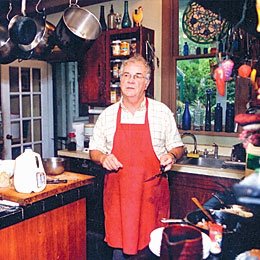
Springtime and Sustainable Food in the Mountains
We spent the last week, more or less, in Asheville NC doing promotional stuff for Veggie Revolution. Sara Kate is working right now at Sunnybank Inn near Asheville. We did presentations at two colleges (Mars Hill and Warren Wilson), at Malaprops bookstore, at two natural food stores (Earth Fare and Greenlife), and at the Asheville Friends Meeting House. And an interview on WCQS radio. Sara Kate was interviewed last week by The Mountain Xpress, a weekly newspaper in Asheville. It was a pretty intense week, but fun. Asheville is a refreshingly progressive community, especially for North Carolina. I enjoyed the profusion of liberal and environmental people with attitudes. I liked this bumper sticker: "Where are we going? And why am I in this handbasket?"
I want more bumper stickers!
Elmer Hall, who owns Sunnybank Inn, and Matt McGuire, who works for Elmer, set up most of the events. Just to promote the book. I am very grateful for that, I know it was a lot of work. Between the two of them, I think they know just about everybody in Asheville. Others who helped make the series of events go smoothly were Aubrey Raper, John Templeton, and Laurie Pedersen of Mars Hill College, Alsace and Andrew of Malaprops bookstore, Megan of Earth Fare, Dustin Rhodes of Warren Wilson College, Amy Joy Lanou of UNCA, and Mary Alice Lamb who served us all a gourmet vegan dinner.
 We met loads of interesting people. Elmer was right up there at the top. He's a Buddhist and an Episcopal minister. How does that work? He went into the Peace Corps after college and taught high school in Singapore, where he had lots of Buddhist and Taoist friends. The Inn is full of Asian wall hangings and zen meditation cushions. After his Asian thing, Elmer returned to the States, went to grad school, and became a chaplain at Duke University. Did that a few years, then he and some friends opened the first vegetarian restaurant in NC. Now he and his 3 or 4 employees offer beds and scrumptious vegetarian meals to hikers from the Appalachian Trail, which runs right across the Inn's front yard. When prodded about Buddhism's messages for life, Elmer told me that human suffering comes from our desires. Americans want too much, he says. If we desire less, then we'll suffer less. I tried to get Elmer to tell me more about living simply, and about the connection between suffering and desire, but he declared himself unable to ponder such matters while chopping onions for the evening meal's soup. He was blotting his eyes at the time, from onion fumes, so I had to relent. Next time.
We met loads of interesting people. Elmer was right up there at the top. He's a Buddhist and an Episcopal minister. How does that work? He went into the Peace Corps after college and taught high school in Singapore, where he had lots of Buddhist and Taoist friends. The Inn is full of Asian wall hangings and zen meditation cushions. After his Asian thing, Elmer returned to the States, went to grad school, and became a chaplain at Duke University. Did that a few years, then he and some friends opened the first vegetarian restaurant in NC. Now he and his 3 or 4 employees offer beds and scrumptious vegetarian meals to hikers from the Appalachian Trail, which runs right across the Inn's front yard. When prodded about Buddhism's messages for life, Elmer told me that human suffering comes from our desires. Americans want too much, he says. If we desire less, then we'll suffer less. I tried to get Elmer to tell me more about living simply, and about the connection between suffering and desire, but he declared himself unable to ponder such matters while chopping onions for the evening meal's soup. He was blotting his eyes at the time, from onion fumes, so I had to relent. Next time.
The other folks who work at the Inn were equally entertaining. Matt - well, Matt's just one of my favorite people period. I've known him for a couple of years, and he's always good for an adventure. Matt is a young man who can spring from full slumber to breakfast duty in a matter of, literally, seconds. With a versatile 'do and threads, he's at the ready day or night. He does have to set his internal alarm clock the night before, or efforts to rouse him the next morning will fail. So he says. Matt and Sara Kate have been interested in sustainable food for a long time. The two of them thought up the theme "Food Ethics" for the communal household they lived in at Guilford College last year. Matt and Sara Kate also ran Guilford's community service program for its students in Guadalajara Mexico last fall. That was one of their biggest adventures. Matt will ride his bike from Asheville to Charlotte and back when the urge strikes him, and think nothing of it. Sleep beside the road somewhere. Or from Guadalajara to the Pacific coast, he's done that too. He's a lad unfettered by conventional thinking.
Jonathan is an interesting guy too. He works at the Inn, and at Elmer's farm, up the road. Jonathan introduced me to stewed or steamed nettles, which are quite tasty. He claims that nettles and other wild greens are higher in nutrients than cultivated greens. I believe it. While the hikers at the Inn feast on waffles or pancakes or Sara Kate's spicy muffins for breakfast, Jonathan eats every morning what he calls rice "gruel." It's a bowl of brown rice with something added. While I was there he had acquired about 40 lbs of someone's surplus apples and had made apple sauce. A lot of apple sauce. So the next morning he had, I think, nettles and apple sauce on his gruel. It doesn't sound that good. But it looked good. I think it was good. He was enthusiastic about it.
I asked Jonathan what his favorite food was, thinking he might say chocolate cake or pie or something like that. He's 24. Young men like to eat. But he said tomato sauce. After that, cucumbers. In summer, he says, he can eat a cucumber every 10 minutes. Or he might alternate between cucumbers and spinach. He's partial to dark green winter squash too. And Japanese pumpkins. Jonathan is going to be food maverick in some way. I can see he's building up steam toward something, some new way of thinking or writing about food. Just about the whole time I was at the Inn, Jonathan was in Elmer's big kitchen, experimenting. Cooking up something crafty. He's nice too. He shared a whole square of his precious vegan chocolate with me. A little square. But still, a whole one, just because I was curious about it. Now I know about vegan chocolate.
Brian also works at the Inn. He regaled us with his travel stories on more than one occasion, until we were in danger of losing bladder control. I especially enjoyed the one about the Canadian nurses, and the German hostel where the youth group tossed the mattresses out the windows, and the wombat in Australia that turned out to be a territorial basset hound. Thank you Brian. I look forward to more stories, and to hearing the real truth about Starbucks, and the insider scoop on the coffee industry. The second largest commodity traded in the US (in volume of trades). Is that what you said?
The panel discussion on sustainable food that we participated in at Mars Hill College on April 6 was one of our favorite events of the week. We met Andrew Euston of GreenBridges Sustainability Consulting there, also saw Pat Tompkins and other illustrious persons in the green community near Asheville. During the panel we were talking about the resistance factor that keeps people from getting on board the humane and sustainable food bandwagon. Lots of folks wish to believe that, here in America, we can trust what the government tells us, and can even trust what corporations tell us. The average American wants to believe that no one is engaged in false advertising, that the goal of big business and our administration is to serve and protect the interests of consumers. At the Mars Hill panel discussion, we talked about how giant food corporations do not have our best interests at heart, but rather exist to create profits for stockholders - and we talked about how scary it is to take the first step in admitting that. It's scary to admit that all is not well in the food industry. Because once you admit that, it opens the door to disillusionment. It can lead to a complete change in world view. What do you trust? Andrew Euston used the word "grieving." We all agreed that when we first admit we're being lied to and deceived by food corporations and the government, we grieve the loss of trust, the loss of innocence, the loss of our illusion of safety.
The solution, we agreed, is to educate oneself, to become informed consumers. To buy local food from providers whose methods we can see. To be selective in who we choose to support with our consumer dollars. For more information about finding local humane and sustainable providers of produce and animal products in the mountains, contact the Appalachian Sustainable Agriculture Project. For information about local food elsewhere in North and South Carolina, contact the Carolina Farm Stewardship Association. Elsewhere in the country, check out your local farmers' markets and look at Local Harvest and Eat Wild. If we all are willing to change our diets a little bit, to support providers who are raising food without fouling the environment and without keeping animals in misery, then we can put the corporate meat giants out of business. We really can!


No comments:
Post a Comment